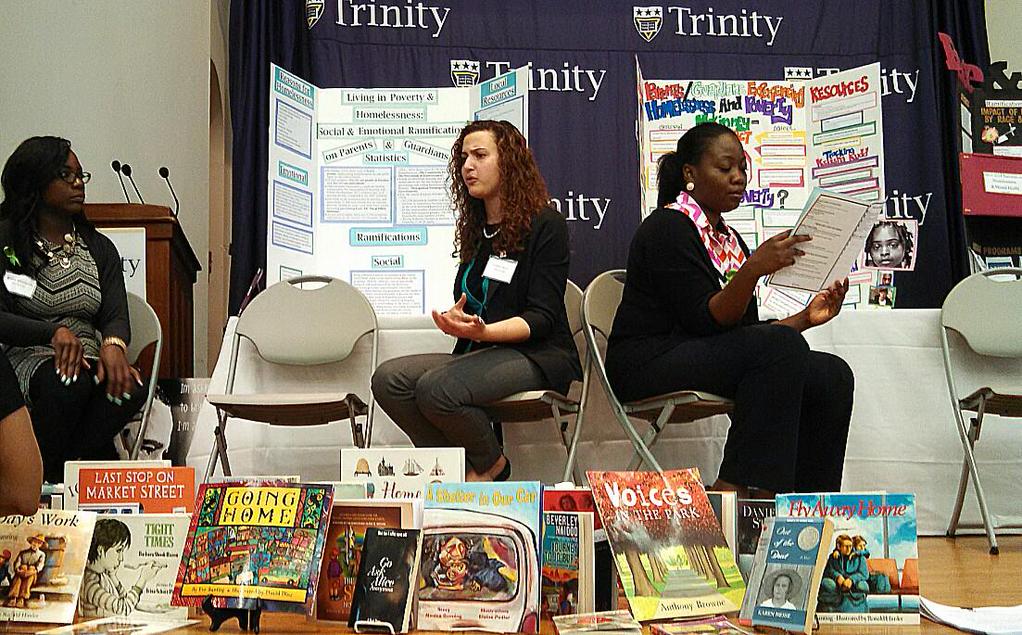When 8-year-old Relisha Rudd vanished from DC General family shelter over a year ago, her disappearance brought attention to the welfare of homeless children.
Relisha’s story pushed Trinity Washington University’s School of Education to task its graduate students with researching poverty and homelessness among children in the District for the next year. Their findings were presented at a seminar on Thursday, August 30, preceded by a panel discussion with six professionals in the field.
The panel, aiming to find solutions to child poverty in the District, was framed around the question “Where is the Outrage?”
Nationally, 1 in 30 children experience homelessness. However in the District that number is 1 in 20, according to Dr. Cynthia Greer, Trinity Associate Professor with the Educating for Change program.
When compared to other industrialized nations, the U.S.’s high child poverty rate is second only to Romania, according to Caroline Fichtenberg, research director for the Children’s Defense Fund.
Almost every homeless child has witnessed at least one incident of violence, Greer said. This can have long-standing psychological effects on children.
Most of the panelists agreed that federal aid for children in poverty could do more. Currently, many federal programs to help people and families living in poverty are not fully funded. If an additional 2 percent of the federal budget were invested in existing aid programs, child poverty in the U.S. would be reduced by 60 percent, according to the Children’s Defense Fund.
This lack of funding is exemplified in the current “welfare lottery,” as described by panelists Dea Lott and LaJuan Brooks. Three in 4 families that qualify for aid never receive it, according to Lott. She and Brooks have both experienced homelessness, and they shared their experiences to illustrate some of the discussion.
“It deeply impacted our families to be turned down for aid that we needed and deserved,” Brooks said.
Lott is a lawyer working with the Washington Legal Clinic for the Homeless to help their clients obtain low-barrier legal services and advocacy. She argued that there was indeed outrage over child homelessness, but not in the necessary places.
“Asking the question as though there is no one angry about this situation is misguided. The people that these situations are affecting are certainly outraged,” Lott said in response to the panel’s theme. “But their voices are not heard, especially not by policymakers and companies.”
Segregating wealthier people and wealthier neighborhoods from the poor[a] prevents true empathy because communities do not interact, said Lott. The only way to understand where the outrage is and where it needs to be is to listen to the voices of people living in poverty.
“These changes involve more than just improving current systems; it requires taking a critical look at those systems,” Lott said.
The panelists agreed that education and social change are a necessary part of the solution. The combination of activism and advocacy is essential because without it, the situation cannot truly change.
School should be a source of stability for homeless children, according to Barbara Duffield of the National Association for the Education of Homeless Children and Youth. However, according to her research, children living in poverty experience a drastic increase in the rate of school dropout.
“Service is not enough without social justice,” said Jamila Larson, founder and executive director of the Homeless Children’s Playtime Project. “Activists working with the homeless community must move beyond providing shelter to advocate for policy changes.”
Important changes in society and education begin with the young people growing up in poverty right now, according to Larson.
“They are poised to take action and improve their own lives and the lives of those in their communities,” Larson said. “Our duty as a community is therefore to listen to those voices and help to facilitate that change.”








